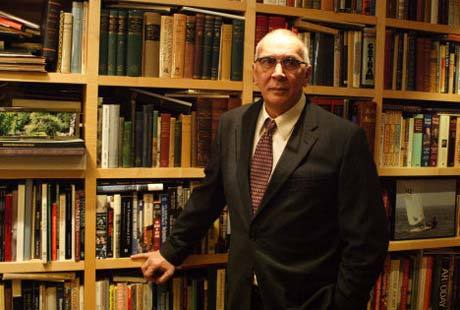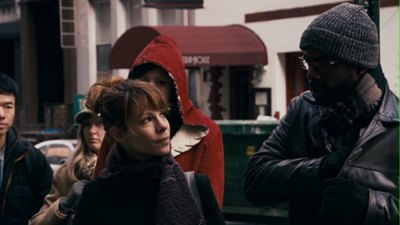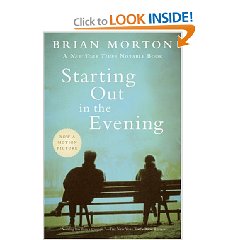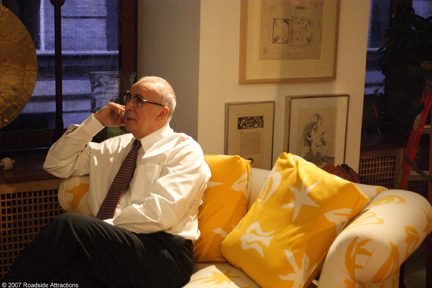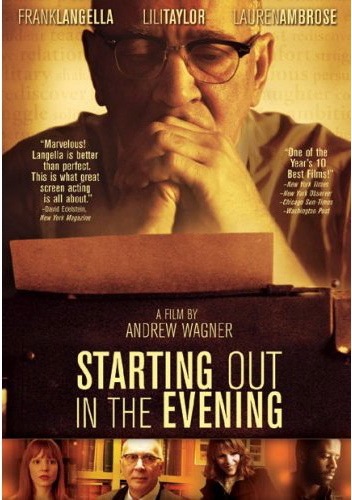From the Chicago Reader (December 13, 2007). — J.R.
Starting Out in the Evening
Directed by Andrew Wagner ***
The two most interesting movies I saw at press screenings last summer had their opening dates postponed, and it’s not hard to imagine why. As Orson Welles experienced time and again, features that are fresh and unconventional are harder to gauge as commercial prospects than stale conventional ones — and thus they’re harder to sell. This explains both the box-office success of Welles’s relatively pedestrian The Stranger (1946) and the delayed and relatively unprofitable U.S. releases of many of his other features, starting with Citizen Kane and continuing through The Lady From Shanghai, Othello, and F for Fake, among others.
Neither Jon Poll’s Charlie Bartlett nor Andrew Wagner’s Starting Out in the Evening is a masterpiece, but both films exemplify a kind of adventurous filmmaking that’s increasingly difficult to envisage in today’s marketplace, where first impressions mean everything — it’s an unpromising climate for any art form. When I saw Charlie Bartlett — an edgy and quirky satirical teen comedy, unusual for both its nervy politics and its class consciousness — in mid-July, it was scheduled to open in early August. Since then it’s been rescheduled for early February and then bumped again to later the same month.
I also saw Starting Out in the Evening — adapted from Brian Morton’s novel by Wagner and cowriter Fred Parnes — in mid-July. It’s finally opening this week. Much of the film’s novelty derives from its characters, the sort one almost never finds in “commercial” films — both flawed and sympathetic — and it keeps them vivid, ambiguous, and three-dimensional throughout. Heather (Lauren Ambrose) is a feisty, impulsive grad student in her mid-20s writing her master’s thesis on Leonard Schiller (Frank Langella), a Jewish New York novelist in his 70s whose four published novels are all out of print. Heather says Schiller’s first two novels helped her to claim her own personal freedom and tries to convince him that she might be able to bring his works back into circulation. Despite enormous differences in age and temperament, the two develop an uncertain but increasingly intimate relationship.
Meanwhile, Schiller’s devoted daughter Ariel (Lili Taylor), a dancer turned aerobics instructor, is pushing 40 and longs to have a child. After she unexpectedly encounters her former boyfriend, Casey (Adrian Lester), they uneasily resume their relationship. Casey, a black academic now helping to launch a new leftist magazine, has a son from a former marriage and is determined not to have any more offspring. Their mutual affection is palpable, but they remain at loggerheads about this issue.
The film induced me to read Morton’s beautifully realized novel, which is so much a literary creation that it hardly seems like movie material. It takes a special kind of writer to get so much mileage out of a lengthy description of someone (Schiller) opening a bottle of seltzer, let alone to make it the subjective observation of another character (Heather), telling us something about her in the process. This couldn’t be re-created in a movie without a great deal of self-consciousness (and Wagner understandably doesn’t attempt it) but Morton manages to keep it all light and functionally integral. Over the course of the story he oscillates gracefully and regularly between the viewpoints of all four characters (Casey, who enters the novel at the halfway point, gets less space than the others), something a movie couldn’t begin to do with the same ease.
Other omissions include the explanation of the title Starting Out in the Evening (it’s the title of an unpublished early novel by Schiller and indicative of his glum conviction that he was born too late), Schiller’s fulfillment of a vow he made with his late wife to visit Paris, his frustrated anticipation of an appreciative essay about his work promised by Edmund Wilson, Heather’s surreptitious reading of his novel in progress, a meeting of Casey with his son, and the detail that Casey’s mother was Jewish. One curious yet defensible alteration: in the book, Casey winds up reading and admiring Schiller’s third novel, Stories of the Lives of My Friends, about the 60s, which he much prefers to the earlier novel Tenderness, about a Paris romance — in contrast to Heather, whose life has been changed by Tenderness but doesn’t much care for the third book. In the film, it’s Schiller’s fourth novel, The Lost City — set in the 20s and dealing with the generation of Schiller’s immigrant parents — that Casey admires. Without quoting a single line from any of the half-dozen Schiller novels he evokes, Morton manages to elevate each to the status of a full-fledged character.
A surprising number of other things from the novel are transposed into the film’s dialogue, or else simply get implied in the remarkably detailed and suggestive performances. Arguably nothing of importance is lost as far as characterization is concerned, and in this sense at least Wagner’s movie is an uncannily faithful adaptation. These are essentially the same people, fully and complexly realized — all the more interesting since Wagner asked the actors not to read the book.
Through his periodic shifts in viewpoint and his refusal to place the reader in any objective or “neutral” space, Morton suspends or at least greatly complicates most of the moral judgments that the novel’s actions seem to demand. Wagner, who can’t draw on the same narrative techniques, still manages to raise many of the same issues, often posing them in a manner that’s even more direct and confrontational and allowing the viewer just as much freedom in coming to terms with them. Is Heather exploiting Schiller’s sexual vulnerability? Is Casey, knowing Ariel’s desire to have a child, exploiting hers? Can Casey’s awareness of his inadequacy as a father be compared in any way to Schiller’s feelings about having been an inadequate parent to Ariel? All four characters are unusually intelligent and self-aware (though Ariel, unlike the other three, isn’t an intellectual), but are we ready to accept their own critical self-estimations, or are we more apt to view them critically through the eyes of the other characters?
Do we deem Schiller and his daughter both failures, as they’re often prone to view themselves, or as successes in certain ways they don’t recognize, corresponding to the ways Heather views Schiller’s first two novels and Casey views Ariel’s lack of inhibition? Does the aggressive manner in which both Heather and Casey pursue their careers and intellectual interests make them more or less self-centered than Schiller and/or his daughter, and more or less likely than them to succeed?
This is a far from exhaustive list of the kind of questions the performances pose, and it’s central to Wagner’s sensitive and attentive direction to keep us asking.



